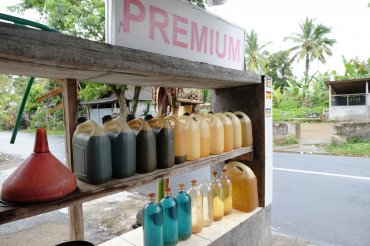Lubricants sold in Indonesia will be required to comply with a new national standard beginning Sept. 11, 2019, according to a regulation published last month by the countrys Ministry of Industry.
The regulation, numbered 25/2018, also states that lubricant blenders have to meet certain administrative requirements, and upon approval will be required to include the SNI logo on their products.

Photo: Tulika Kim/Shutterstock
A roadside stand offering motor oils in Bali, Indonesia. The Indonesian government will require lubricants sold in the country to comply to a new national standard next year.
Administrative requirements include designation of an in-country brand representative for foreign players. Manufacturers outside of Indonesia have to appoint a company as representative for the administration of SNI, [but] not necessarily a branch office or official representative. Even the importing company for the lubricant will do, advised Ilman Hizbullah Hasibuan, consulting manager of Ipsos Business Consulting, which is headquartered in Hong Kong.
SNI also requires labels to be translated into Bahasa, Indonesias official language.
Non-SNI compliant lubricants cannot be sold in Indonesia. Imported lubricants without SNI certification would not be able to pass through customs according to regulations, said Ilman.
Companies that sell lubricants not complying with the standard will have their business licenses and product licenses revoked.
Generally, we do not see this as a big issue for large lubricant manufacturers. SNI standards are relatively common and more or less follow international lubricant standards, Ilman advised.
For smaller brands, usually imported, with only a handful of sales in Indonesia, this will be a problem for sure, and a new product launch may be delayed, though most manufacturers will become familiar with the process for future products, he continued.
SNI is meant for standardization as well as consumer protection, commented Patrick Adhiatmadja, CEO of lubricant marketer Federal Karyatama, an ExxonMobil subsidiary based in Tangerang, Indonesia.
Ilman believes the standard should make it more difficult to sell counterfeit, un-branded lubricants or those made from inadequately recycled used oils. However, the standard may have a negative impact on lubricant importers or manufacturers selling in small volumes or for a niche market.
Based on the information we have, the cost for SNI application is quite expensive. We cannot confirm it yet, but some sources say it is around U.S. $25,000 per product line. If a product line is manufactured in a different place, then it has to be tested separately as well, he said.
This is not a one-time cost. The SNI label will only be valid for four years, meaning companies will have to go through a reapplication process every four years.
SNI for lubricants was first proposed in 2005. A technical committee developed the standard with advice from the Ministry of Energy and Mineral Resources and the Ministry of Industry. The Product Certification Institute, which was accredited by the National Accreditation Committee, will be responsible for issuing SPPT-SNI certifications to identify products that comply with the standard. Compliance will be enforced by the National Standardization Agency of Indonesia.